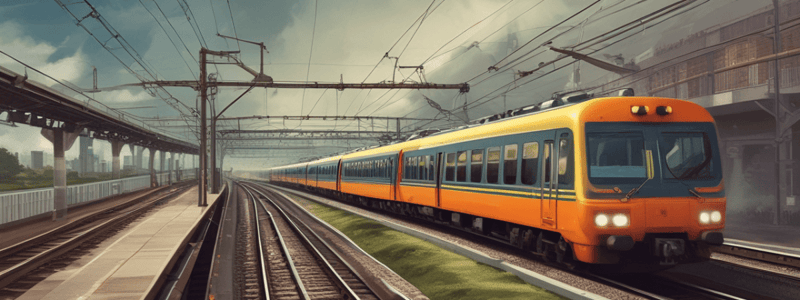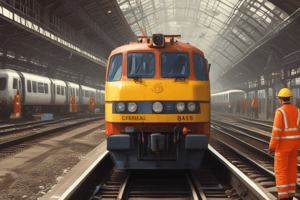Podcast
Questions and Answers
What is the safe distance from detonators being tested?
What is the safe distance from detonators being tested?
- 75 metres
- 30 metres
- 60 metres
- 45 metres (correct)
When placing warning signals, what should the railway servant prioritize?
When placing warning signals, what should the railway servant prioritize?
- Using the signal only during the night
- Showing the signal to give timely warning to the approaching train (correct)
- Ensuring the signal is visible from a distance of 1 km
- Placing the signal in the middle of the track
What is the purpose of a warning signal?
What is the purpose of a warning signal?
- To indicate the end of a block section
- To give timely warning to a driver of an approaching train of any obstruction (correct)
- To indicate the start of a block section
- To signal the arrival of a train
Why should staff place themselves on the rear side when observing the safety radius?
Why should staff place themselves on the rear side when observing the safety radius?
What is used to warn the incoming train of an obstruction during the day?
What is used to warn the incoming train of an obstruction during the day?
What is the primary concern for contractors working on track renewals, gauge conversions, etc.?
What is the primary concern for contractors working on track renewals, gauge conversions, etc.?
What should railway servants ensure when using warning signals?
What should railway servants ensure when using warning signals?
What type of obstruction might require the use of a warning signal?
What type of obstruction might require the use of a warning signal?
When can a JE/SSE/P.Way commence work on a running line in an emergency?
When can a JE/SSE/P.Way commence work on a running line in an emergency?
What should be done before commencing work on a line that can be isolated from other running lines?
What should be done before commencing work on a line that can be isolated from other running lines?
What should be done to points when isolating a line by setting them?
What should be done to points when isolating a line by setting them?
Why should a JE/SSE/P.Way notify the Station Master as soon as possible?
Why should a JE/SSE/P.Way notify the Station Master as soon as possible?
What is required before commencing work on a running line at a station?
What is required before commencing work on a running line at a station?
What should be provided when commencing work on a line that cannot be isolated from other running lines?
What should be provided when commencing work on a line that cannot be isolated from other running lines?
Why should a JE/SSE/P.Way retain the keys of locking device in his possession?
Why should a JE/SSE/P.Way retain the keys of locking device in his possession?
What should be done when commencing work on a line that can be isolated from other running lines?
What should be done when commencing work on a line that can be isolated from other running lines?
What is the minimum distance required for a clear view when working a trolley without block protection?
What is the minimum distance required for a clear view when working a trolley without block protection?
When is a Flagman with detonators required to precede or follow the trolley?
When is a Flagman with detonators required to precede or follow the trolley?
How many Flagmen are required to precede and follow the trolley on a single line without block protection?
How many Flagmen are required to precede and follow the trolley on a single line without block protection?
What is the purpose of intermediate Flagmen?
What is the purpose of intermediate Flagmen?
When can the Flagman be withdrawn?
When can the Flagman be withdrawn?
What signal should the Flagman wave to warn the official-in-charge of the trolley of the approach of the train?
What signal should the Flagman wave to warn the official-in-charge of the trolley of the approach of the train?
How many detonators should be placed on the line to protect the trolley?
How many detonators should be placed on the line to protect the trolley?
What signal should the official-in-charge wave to indicate that the trolley has been removed?
What signal should the official-in-charge wave to indicate that the trolley has been removed?
What should the Station Master/Signalman do when the official-in-charge advises the trolley programme?
What should the Station Master/Signalman do when the official-in-charge advises the trolley programme?
What is the purpose of hanging a placard in front of the block instrument?
What is the purpose of hanging a placard in front of the block instrument?
What should the Station Master/Signalman do when telegraph and telephone communications are interrupted?
What should the Station Master/Signalman do when telegraph and telephone communications are interrupted?
When should the Station Master/Signalman issue caution orders to Drivers of all trains entering the block section?
When should the Station Master/Signalman issue caution orders to Drivers of all trains entering the block section?
What should the Station Master/Signalman do when communication between the two stations is restored?
What should the Station Master/Signalman do when communication between the two stations is restored?
On a double line, what should the Station Master/Signalman do when issuing caution orders?
On a double line, what should the Station Master/Signalman do when issuing caution orders?
What is the purpose of the form Annexure-8/8?
What is the purpose of the form Annexure-8/8?
Who should be advised when the trolley programme is received?
Who should be advised when the trolley programme is received?
What is the maximum speed for a Material train when the engine is pushing the train?
What is the maximum speed for a Material train when the engine is pushing the train?
When stabling a Material train, where should it not be stabled?
When stabling a Material train, where should it not be stabled?
What should the Guard do when passing over points?
What should the Guard do when passing over points?
What must the Station Master ensure when a Material train is stabled?
What must the Station Master ensure when a Material train is stabled?
What should the Guard do when the Material train is ready to leave the siding or line?
What should the Guard do when the Material train is ready to leave the siding or line?
What must the Station Master do with the keys of the padlocks?
What must the Station Master do with the keys of the padlocks?
What should the Guard ensure before relinquishing charge of the Material train?
What should the Guard ensure before relinquishing charge of the Material train?
What must be done to points when stabling a Material train?
What must be done to points when stabling a Material train?
Study Notes
Emergency Work Procedures
- In an emergency, work may be commenced after protecting the line as per GR 15.08 and 15.09, without issuing notice to the Station Master.
- If the work is likely to be prolonged, the Station Master should be notified as soon as possible.
Works in Station Limits
- No work should be commenced on a running line at a station without the written permission of the Station Master and until the relevant signals have been placed at 'ON'.
- Before commencing work on a line that can be isolated from other running lines, the JE/SSE/P.Way should ensure that the line has been isolated and retain the keys of the locking device in their possession.
- Before commencing work on a line that cannot be isolated from other running lines, the JE/SSE/P.Way should provide prescribed hand signals, detonators, and banner flags.
Safety Precautions
- When detonators are being tested, no person should be allowed within a radius of 45 meters from the detonators to be exploded.
- The engine crew should remain well within the cab.
- Staff should place themselves, as far as possible, on the rear side of the detonators.
Warning Signals
- Red flashing hand signal lamps are used at night, and red flags are used during the day to warn incoming trains of an obstruction.
- Warning signals should be used to give timely warning to a driver of an approaching train of any obstruction, such as a derailed train, breaches, washaways, floods, or landslides.
Safe Working of Contractors
- Adequate safety measures should be taken for the safety of trains and the workforce when contractors are working on track renewals, gauge conversions, doublings, bridge rebuilding, etc.
Protection in Block Sections
- When a trolley is worked without block protection and a clear view is not obtainable for an adequate distance of 1200 meters, precautions should be taken, including:
- Deputing a Flagman with detonators to precede or follow the trolley and to exhibit a hand danger signal at a distance of not less than 1200 meters.
- Posting intermediate Flagmen to relay signals if necessary.
- The Flagman should only be withdrawn when a clear view of at least 1200 meters can be obtained in the direction from which trains may approach.
Speed of Material Trains
- When running between block stations with the engine leading, the speed of Material trains shall not exceed that prescribed for a goods train with a similar load.
- When the engine is pushing the train and the brake-van is not leading, the speed must not exceed 10 Kmph, and the Guard must travel on the leading vehicle and exhibit hand signals to the Driver.
Stabling of Material Trains
- Material trains should not be stabled on running lines at a station, except in unavoidable circumstances.
- When a Material train is stabled at a station, it should be protected by:
- Securing the vehicles and ensuring they are not fouling any points and crossings.
- Setting all necessary points against the line on which the Material train is stabled and securing them with clamps or bolts and cotters and padlocks.
- Keeping the keys of such padlocks in the Station Master's personal custody until the Material train is ready to leave the siding or line.
Studying That Suits You
Use AI to generate personalized quizzes and flashcards to suit your learning preferences.
Related Documents
Description
This quiz covers the safety protocols and procedures to be followed by railway officials in emergency situations, including protecting the line and notifying the Station Master.




